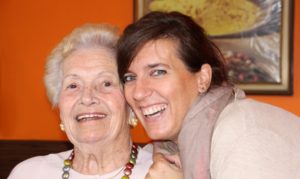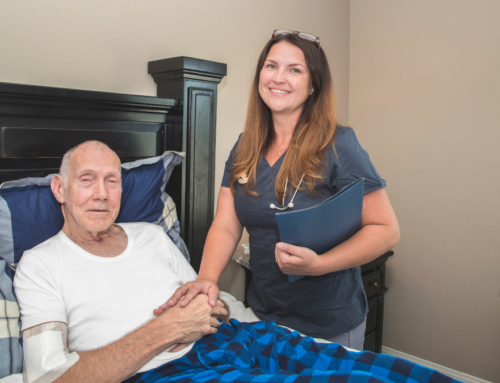
Learning to Appreciate the Humorous Side of Caregiving
Caregiving can be a challenging and stressful profession…but it also has it’s unexpectedly funny moments…when you can learn to appreciate them.
Even in the most stressful situations, professionals in senior care say that laughing can even be helpful for the caregiver, as well as the patient. “Not only is laughing alright, it’s absolutely necessary,” says Cindy Laverty, a former caregiver who founded The Care Company and The Cindy Laverty talk show.
Laverty had no plans to be a caregiver, but was instead thrust unexpectedly into it, and had to learn how to navigate the complexities and overwhelming responsibilities that come with this profession. The journey helped her discover how she could not only survive, but thrive, in this unfamiliar world. “Finding and holding onto humorous stories can help you keep an upbeat perspective in spite of the challenges of being a caregiver”, she explains.
“We go into caregiving with this big, dark cloud hanging over us because it’s so stressful. When we go in with that attitude, it’s bound to stay that way. When we’re having a horrible day, we must remember that a good day is sure to follow. Even in the midst of those horrible days, there are funny moments that happen. Recognize and appreciate those moments,” Laverty urges.
Laughing with them
Alzheimer’s disease (AD), for example, is an awful condition, and, while there is nothing funny about it, there are funny moments that happen. When you laugh, you’re laughing because the moment is funny, you’re not laughing at the person. “If we don’t follow the whole spectrum of emotion, we get lost in the oppression of a chronic disease,” Laverty explains.
Laughter can actually send a positive message. It can diffuse a potentially difficult or awkward situation, especially those most challenging moments. Laughing is a fantastic way of relieving tension for both the caregiver as well as the person with Alzheimer’s, who is greatly impacted by the tensions and emotions surrounding them.
Laughing instead of crying
Caregiver Carol Bradley Bursack shared a story where she was visiting her friend, whose mother had mid-stage Alzheimer’s. While she and her friend were chatting, her friend’s mother abruptly stood and said, “You can go now.” Having worked with people for years who had dementia, she didn’t take offense, but simply agreed with her friend’s mother, thanked them for the visit and left.
In another example, Justin Halpern moved in with his 73-year-old father after hitting hard financial times. He soon discovered that, with old age, his father had lost all inhibitions and said whatever was on his mind. Justin describes his dad as “like Socrates, but angrier and with worse hair,” began writing down his father’s rants and posting them to a Twitter account. Now more than a million people follow Halpern’s philosophical musings on Twitter. As a result, Halpern was offered a book deal. In less than three months, the aptly named “Sh*t My Dad Says” made it to the New York Times Bestseller List.
Through it all…
Whether you are a Caregiver by profession, or by circumstance, the responsibility and challenges remain the same. Nobody is arguing that Caregiving can be difficult, challenging, frustrating, and often overwhelming work…but, rather than falling victim to that mindset, it pays to hold onto the hope and knowledge that you are making a positive impact on your patients’ lives. Humor can help you maintain perspective.
As you go through the day, hold onto the funny moments. Hold onto the happy moments, the moments of clarity, of joy, of solitude, of peace, and don’t let the tough moments get you down. When you reflect on your day, try to highlight the funny experiences…if it helps, write it down…you never know, maybe you can be the next NY Times best seller.
And, if you are a caregiver by circumstance, and you want to find out if you have any alternatives, contact us, we would be happy to talk to you, and explore your options with you.





